Spotify clashes with Apple but isn’t so angelic itself
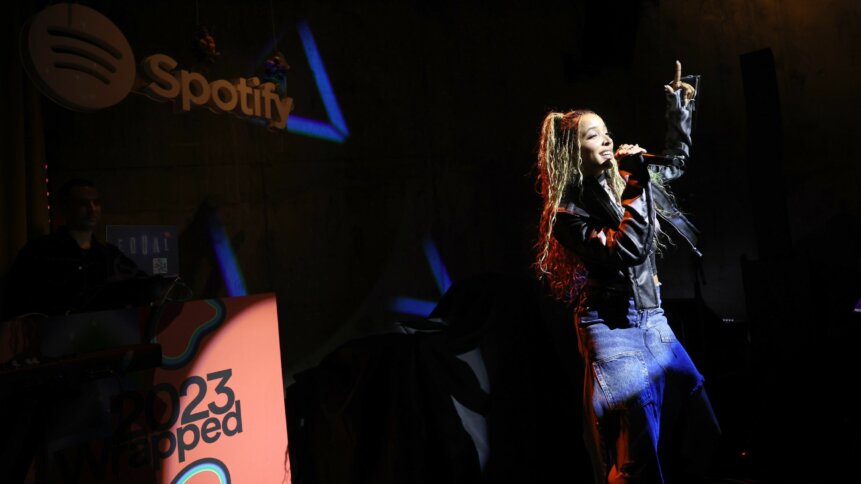
- Spotify profits from artists but barely pays them.
- The company also fires the minds behind its most successful concepts.
- New fees introduced by Apple in the US are attacked by Spotify.
New transaction fees of up to 27% are being levied by Apple, much to Spotify’s discontent. On Wednesday, Apple announced it would allow app developers to sell products outside of its own store – provided they still pay a commission.
The firm introduced the fees in the US after a long legal battle with Epic Games. The court found in favor of Apple on several issues, but it fell foul of a law by not allowing app developers to tell people about other ways of paying, including through links that bypass Apple’s App Store payment system.
Although in practice using the App Store payment system doesn’t incur a fee for 85% of developers, small developers are meant to pay around 15% and the biggest developers are charged a 30% fee to use the system.
Following the ruling, Apple has introduced a new set of rules (only in the US, for now) allowing people to subscribe to services outside of its system, but it will still charge developers up to a 27% commission to do so.
Spotify said the move is “outrageous” and accused Apple of “stopping at nothing” to protect its profits.
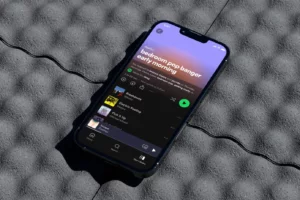
Does Spotify have room for its righteous indignation against Apple? Source: Spotify.
According to court documents filed by Apple, the commission charge is compliant with the court ruling and, the company added, App Store developers benefit from Apple’s services.
“All App Store developers – including those who place buttons or links with calls to action in their apps – benefit from (among other things) Apple’s platform integrity,” it said.
Other benefits to developers that the company listed include “marketing and external advertising, and a safe environment for users to download and purchase apps and in-app content.”
Spotify’s really, really not on board. It says the policy flies in the face of the US court’s attempt to enable competition.
“Once again, Apple has demonstrated that it will stop at nothing to protect the profits it exacts on the backs of developers and consumers under its App Store monopoly,” Spotify said in response to the fee announcement.
This isn’t the first time Spotify has spoken out against the tech giant. In October 2023, it accused Apple of having an “insane” level of control over the internet. Which seems slightly odd coming from a company with a similarly singular hold on the audio-streaming industry.
Why did Spotify attack the fees?
Spotify is the leading audio-streaming platform, with around 600 million users and a 30% market share – double that of its next-largest competitor. Those numbers aren’t set, either: Spotify gets millions of new subscribers every month, and very few of its users cancel.
It might come as a shock, then, to hear that not even the ubiquitous service has consistently managed to turn a profit from audio streaming; that Spotify profits are almost none.
How to make a profit as a streaming service is a problem the whole industry – audio and video – faces. Spotify lost money in its $1 billion push into podcasting, which is a business that’s been far less lucrative than initial expectations promised.
With a market cap nearing $40 billion, Stockholm-based Spotify is competing with services run by giants like Apple, Amazon and Google, all of which don’t need the profits from streaming audio.
“Spotify has consistently led people to believe it would have a profitable business that would justify its valuation and used capital raised on the back of that valuation to chase rainbows,” said Richard Kramer, founder of tech-focused equity-research firm Arete Research. “None of those rainbows were captured.”
Last year, three rounds of cuts at Spotify led to some 2,300 employees being laid off. CEO Daniel Ek announced the latest round of cuts – which claimed 17% of Spotify’s remaining workforce – after reporting strong user growth in the third quarter, the company’s first quarterly profit since the beginning of 2022.
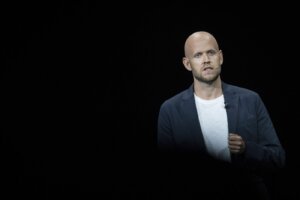
Spotify CEO Daniel Ek. Source: Getty Images.
Executives say the company has made progress transforming from a music-streaming service to an audio company, and that its recent push into audiobooks, coupled with podcasts and music streaming, will bring sustained profits in 2024.
Last month, Ek said the company is spending too much money, but it’s Spotify’s “willingness to spend money to the point of loss-making [that] has been a key factor” in its dominant market position, said Tim Ingham, a music industry analyst and founder of trade publication Music Business Worldwide.
When it launched in 2008 in Europe and 2011 in the US, Spotify presented a third option for accessing music: instead of paying for CDs or risking piracy, users could rent access to more or less all the world’s music for a monthly fee, or in exchange for listening to ads.
Working on the – correct – assumption that listeners would pay for a better experience powered by a music recommendation engine, Spotify settled for royalty terms that proved to be unfavorable long term.
Spotify profits are low, but don’t feel too sorry
One way that Spotify’s managed to stay ahead of deep-pocketed competition is additional features tailored to premium users. The success of a yearly Spotify Wrapped, with quirky graphics and insight into our listening habits, has kept the service ahead.
It’s most recent made-for-you addition is the Daylist, a playlist updated three times a day with songs in the genre you tend to listen to on, say, Friday afternoons. What makes the Daylist unique?
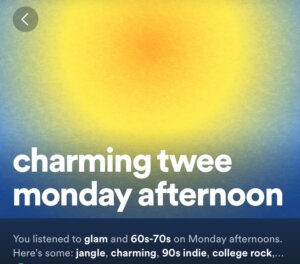
Why yes, I believe I’m charmingly twee this afternoon.
The algorithmically generated playlist comes with a title: you’ve never thought of it as a “wistful power ballad wednesday morning” (fashionable lack of capital letters included) but hey, you guess you do listen to a lot of Adrienne Lenker to get you over Humpday.
Although the feature was introduced in September 2023, it wasn’t until a recent Instagram story template went viral that the feature got widespread attention. Since then, searches for the feature on Spotify have spiked nearly 20,000%.
The genius of the feature – and the Instagram prompt that says “Don’t tell me your astrology sign; I want you to go into Spotify, search for your Daylist and post the title it gave you” – is positioning Daylists as a form of introspection.
Like astrology, such forms teach users something about themselves and give us an easy shorthand to make that known to others. It isn’t that you’re stubborn; you’re a Taurus! You aren’t dreading going back to work, it’s just a “somber soul crushing monday morning!”
The hyper-personalization of Spotify’s algorithmic features capitalize on the same impulse that the astrology boom has: instead of helping people discover new music, it helps them discover themselves. As the adage puts it, if you’re not paying, you’re the product. Nobody historically has realized quite how keen people would be to buy a definition of themselves.
The success of the Daylist feature probably has its creator enthroned at the top of the Spotify office, smugly assigning a “lonely classic saturday evening” to Wings fans across the globe. Right?
A bad track record
Glenn McDonald, the curator of the expansive musical map and database EveryNoise, worked as a “data alchemist” at Spotify. His comprehensive musical databases are responsible for powering everything from Discover Weekly playlists to Daylists.
Then, when 17% of staff were cut from Spotify in December, McDonald was among them. This isn’t the first time Spotify has proven itself to be in it for something other than the music.
Just after 2023’s Spotify Wrapped went live and users were served sandwiches of their top genres that year, Damon Krukowski of Galaxy 500 fame wrote that “Spotify made £56m profit, but has decided not to pay smaller artists like me.”
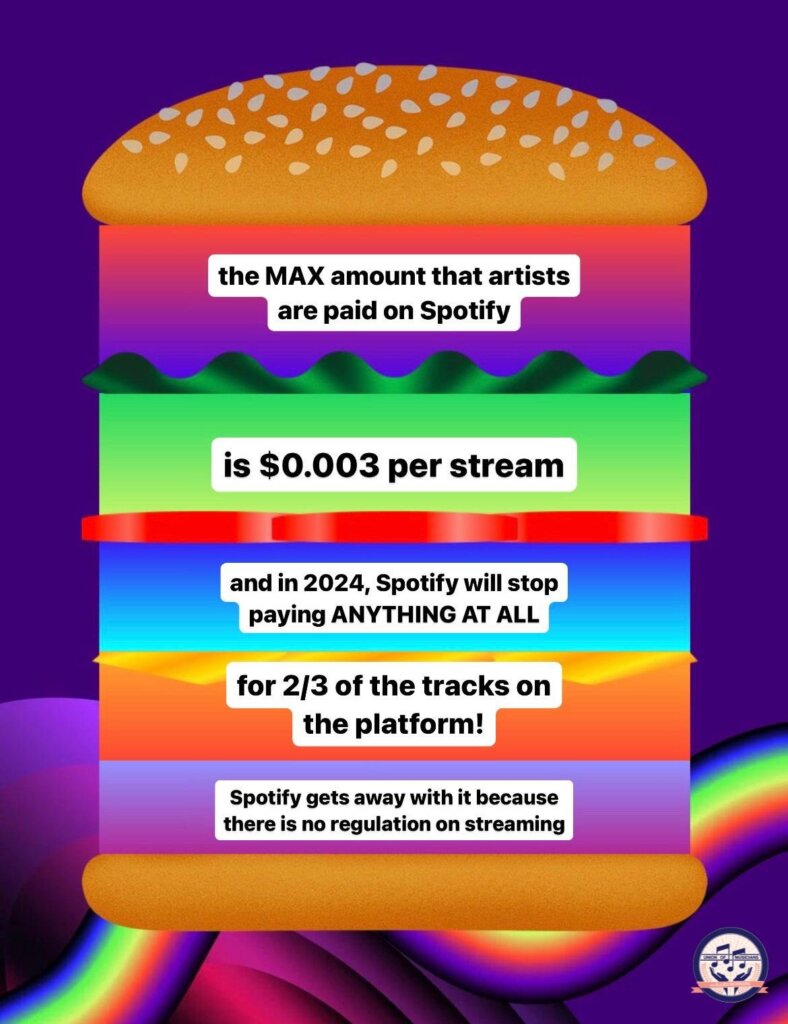
A graphic that was shared on social media, replicating the one Spotify served its users’ data to them in.
It’s an issue that some artists have been vocal about for years: Spotify profits are low, but it pays nearly 70 cents of every dollar it earns from music streaming to music labels and other rights holders. Yet, the maximum a musician earns from Spotify royalties is $0.003 per stream.
Shouldn’t it be the other way round?
So: as it struggles to turn its concept into profit, Spotify is accusing Apple of profiteering, all the while underpaying or outright firing the people responsible for its success.
Maybe dry your tears, Spotify, and reward those responsible for the profits you get?









